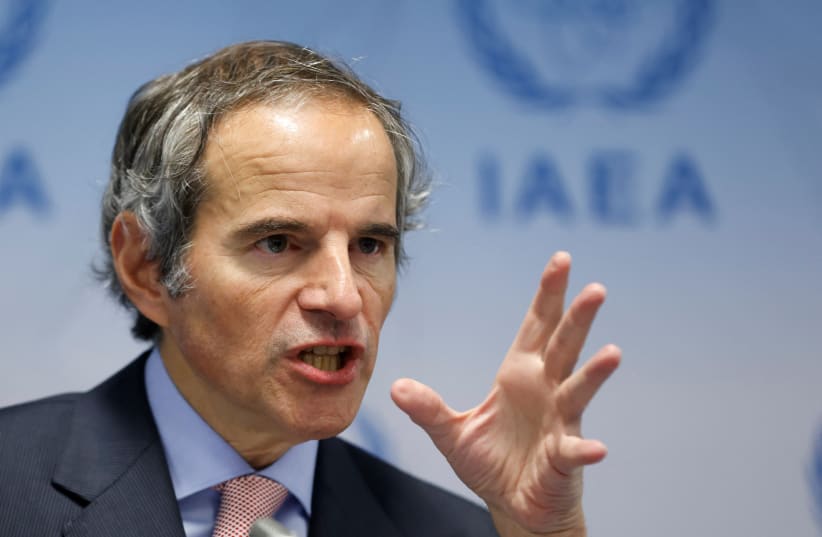ARTICLE AD BOX
IAEA chief Grossi urges restraint on Iran nuclear site attacks, meets Iran’s leaders amid talks on cooperation, as pressure mounts from Western diplomats.
By YONAH JEREMY BOB NOVEMBER 14, 2024 18:48 Updated: NOVEMBER 14, 2024 18:50 International Atomic Energy Agency (IAEA) Director General Rafael Grossi addresses a news conference during an IAEA board of governors meeting in Vienna, Austria, March 6, 2023.
(photo credit: REUTERS/LEONHARD FOEGER)
International Atomic Energy Agency (IAEA) Director General Rafael Grossi addresses a news conference during an IAEA board of governors meeting in Vienna, Austria, March 6, 2023.
(photo credit: REUTERS/LEONHARD FOEGER)
Speaking in a period after Iran has already massively attacked Israel, IAEA Director-General Rafael Grossi on Thursday said that no party should attack Tehran’s nuclear facilities.
In one of three news conferences and meetings he held in Iran, AFP reported Grossi said, "I say this with regards to Iran (...), nuclear installations should not be attacked."
"It is in our power here to take concrete steps that will indicate clearly, to the US and the international community, that we can clarify things and move forward with concrete solutions," Grossi said.
This is not the first time that Grossi has made such statements against Israel or anyone else attacking Iranian nuclear facilities, but it is the first time that he has made such a statement since the Islamic Republic struck the Jewish state on April 13-14 and again on October 1.
Jerusalem has argued that this gave the air force greater legitimacy than ever to strike Iran’s nuclear program, and Defense Minister Israel Katz on Monday said that Israel has the most legitimacy and ability to strike Iran’s nuclear program more than at any other prior point.
Grossi made these comments at a news conference with the head of Iran's Atomic Energy Organization, Mohammad Eslami, telling a joint news conference that "tangible, visible results" in talks with Tehran were vital to avoiding a war.
Next, Grossi met Iranian President Masoud Pezeshkian for the first time since Pezeshkian was elected in July.
Prepared to cooperate
Iran’s president told Grossi that Tehran was prepared to cooperate with the IAEA to clear up "alleged ambiguities" about Tehran's nuclear work, state media reported.
On X, Grossi posted that he was, “Meeting with @drpezeshkian was an essential part of my visit to Iran—an opportunity to engage at the highest level with the new government, listen to his views, and explain my approach and efforts to make progress on one of the most challenging issues on the international agenda.”
Moreover, Iranian Foreign Minister Abbas Araqchi said that Iran is willing to resolve outstanding disputes over its nuclear program but won't succumb to pressure, just as European countries push for diplomacy before Donald Trump's return to the White House.
Stay updated with the latest news!
Subscribe to The Jerusalem Post Newsletter
"The ball is in the EU/E3 court," Foreign Minister Abbas Araqchi wrote on X following talks in Tehran with IAEA chief Rafael Grossi, referring to three European countries - France, Britain, and Germany - which represent the West alongside the United States at nuclear talks.
"Willing to negotiate based on our national interest and inalienable rights, but not ready to negotiate under pressure and intimidation," Iranian state media quoted Araqchi as saying. "I hope the other side will adopt a rational policy."
A senior Iranian official told Reuters that Tehran would send a message to the three European powers through Grossi about Tehran's seriousness in resolving its nuclear standoff while stressing that any pressure on Tehran would have the opposite effect.
Diplomats told Reuters on Wednesday that Britain, France, and Germany were pushing for a new resolution against Iran by the IAEA Board during the November 18-22 meetings to pressure Tehran over what they viewed as its poor cooperation.
Meeting to discuss Iran's nuclear program
At a press conference on September 9 after an IAEA Board of Directors meeting discussing the Islamic Republic's nuclear program, Grossi said that he hoped to meet with Pezeshkian in the very near future, and in any case prior to US election day on November 5.
Clearly, Grossi was hoping to make progress with Pezeshkian and set some positive progress points on the ground in case Donald Trump was elected president, with expectations that a new Trump era would make diplomacy harder for Grossi and others.
During his first term from 2017-2021, Trump pulled the US out of the 2015 JCPOA nuclear deal with Iran, carried out a maximum pressure sanctions and psychological warfare campaign against Iran, supported Israeli operations against the country, and assassinated Islamic Revolutionary Guard Corps Quds Force Chief Qasem Soleimani.
"I am far from being able to tell the international community ... what is happening. I would be in a very difficult position. So it's like they (Iran) have to help us, to help them to a certain extent," Grossi told Reuters on Tuesday on the sidelines of the COP29 climate summit in Baku.
Also on Tuesday, Grossi told CNN, “We are in a moment of particular tension,” Grossi tells me. “They have a lot of nuclear material… They do not have a nuclear weapon at this point. And we have to negotiate.”
Despite all of this, it seems Iran did not want to meet before it knew who would be the next inhabitant of the White House.
Back in September, Grossi noted that since Pezeshkian's inauguration on July 30, there has been no progress whatsoever with the Islamic Republic despite public statements some of its officials have made about trying to improve the situation with the West.
Grossi said, "There has been no progress in the past 15 months towards implementing the Joint Statement of 4 March 2023," in which Tehran had promised to start to fix a number of its nuclear violations and lack of cooperation with the UN nuclear watchdog.

 2 months ago
195
2 months ago
195








 English (US) ·
English (US) ·